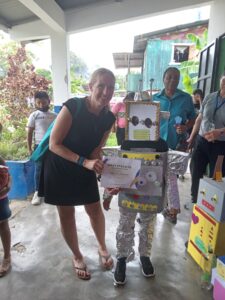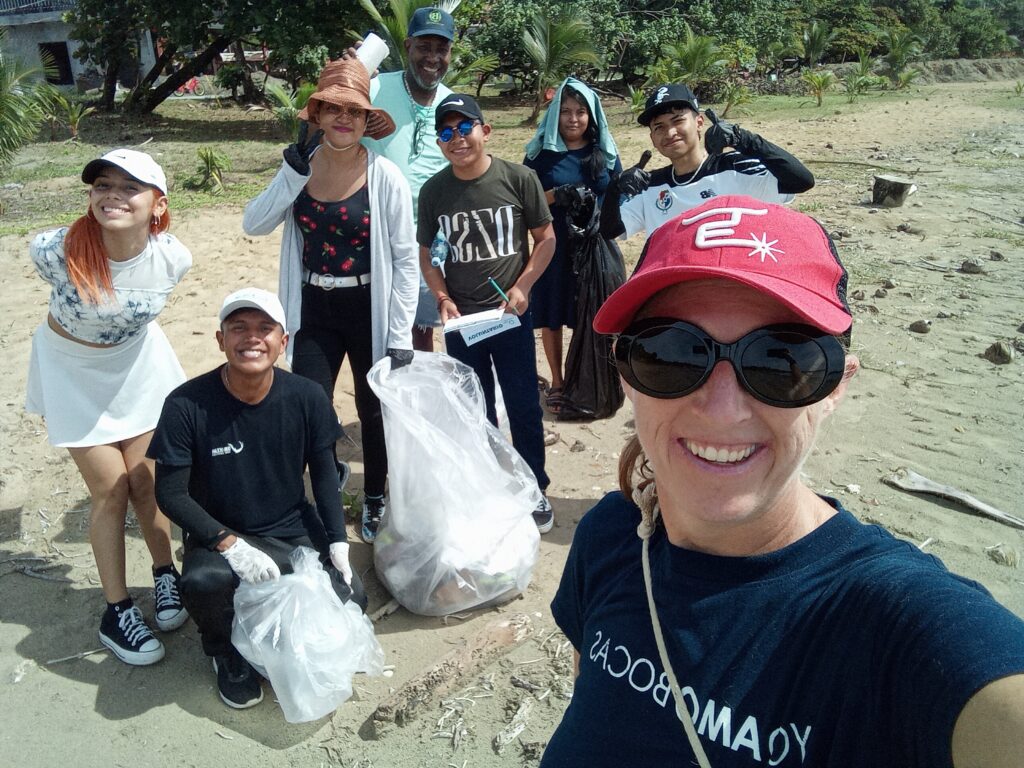The Great Pacific Garbage Patch may be twice the size of Texas, NOAA.
“I feel hope when I see people who are motivated to create a big change through their actions, people who don’t just sit back and say, ‘I can’t do it.’ People who want to know how they can make a difference and what they need to do,” Holly Hummel, MA in Environmental Studies and Community Coordinator at the Tropical Island Biodiversity Studies Center.
 The sound of the ocean radiates peace and serenity, the continuous coming and going of its waves mesmerizes us, and its beauty – and the life that lies beneath – is bewildering. The majesty of the ocean is undeniable. Yet, this vast wonder is in danger due to pollution and climate change, something that Holly Hummel is determined to change through her project For the Love of the Ocean.
The sound of the ocean radiates peace and serenity, the continuous coming and going of its waves mesmerizes us, and its beauty – and the life that lies beneath – is bewildering. The majesty of the ocean is undeniable. Yet, this vast wonder is in danger due to pollution and climate change, something that Holly Hummel is determined to change through her project For the Love of the Ocean.
Holly was awarded a North American Association of Environmental Educators Civic and Environmental Engagement (CEE-Change) Fellowship for 2023-202 and she is the Community Coordinator at the Tropical Island Biodiversity Studies center in Isla Colon, Panama. She has a Bachelor’s Degree in Anthropology with a minor in Zoology from the University of Texas in Austin, Texas, and a Master’s Degree in Environmental Studies at Prescott College in Prescott, Arizona.
Holly has been living, working, and creating projects for environmental awareness in Isla Colon for 11 years, although she was born in Atlanta, Georgia, and raised in a Texas city near Dallas by her parents, along with her brother.
“I have always loved animals and nature,” recalls Holly. “I dreamt of myself going to the rain forest to study it, explore it, and experience it.”
After college, Holly joined the Peace Corps and traveled to Panama for the first time. She was 22-years-old and being in one of the most biodiverse countries in the world was an amazing experience for her.
“When I first came to Panama, I stayed for 2 years,” remembers Holly. “I learned Spanish and got training on how to teach environmental education. I worked with school teachers and taught them about environmental education and how they could use it.”
Pollution Threatens Panama's Biodiversity
The Republic of Panama is surrounded by the Caribbean Sea and the Pacific Ocean. It is one of the most biodiverse countries in the world with almost half of its land extension covered by mountain cloud forests, rainforests, and mangrove wetlands, according to Panama Wildlife Conservation.
Furthermore, Panama has over 10,000 plant species, which include 1,500 tree species and 1,200 orchis species, and 12.4% of these plants are endemic to the country. Also, 5.5% of its fauna is endemic and comprises 1,569 species of mammals, birds, amphibians, and reptiles – among others – according to Forests of the World.
There are only 3 countries in the world that are considered carbon negative, which means that they contribute less than 1 percent to greenhouse emissions, and Panama is one of them; this is attributed – in part – to the small population they have who generates 0.045% of GHG, according to the Climate and Clean Air Coalition.
Unfortunately, according to a study made by Panama sin Pobreza in 2022 1 out of every 4 Panamanians are poor – that is 1.1 million people -, and 1 out of every 10 Panamanians live in extreme poverty or even homeless – that is 464,000 people.
This has led to a growing problem motivated by the economic situation: the exploitation of natural resources and deforestation, according to the Climate Change Knowledge Portal. On the other hand, Panama is also affected by the ocean’s pollution which increases constantly. Around 85% of marine waste is plastic, which is at least 8 million tonnes of plastic being dumped in the oceans yearly. This waste threatens at least 700 marine species, including 1 million birds and 100,000 marine mammals, according to Our Ocean Panama 2023; and continues to enlarge the Great Pacific Garbage Patch that is estimated to be twice the size of Texas, according to the National Oceanic and Atmospheric Administration.
A New Life in Panama
After Holly finished her 2 years as part of the Peace Corps in Panama she had to go back to the United States, where she worked at the San Diego Zoo and the Duke Lemur Center. But life would lead her back to Panama to pursue her dream of working in the rainforest. One of the reasons why Holly decided to live in Panama, besides its immense beauty, is the population’s sense of community, honesty, and kindness.
“I came in 2013,” says Holly. “I knew I wanted to return to Panama, but I needed a job. So I work at a field school that is focused on the environment. It’s called The School for Field Studies and my role is Community Coordinator. Students come from the US to study in Panama about the marine environment, the forest, and sustainable tourism, and I help them connect to people who can teach us about Pamana, the local community, indigenous tour guides who lead us on tours and teach us about different environmental factors.”
The School for Field Studies has 10 centers in different locations around the world and each center operates independently, providing funds for the operations. Students stay for 3 months for the duration of a school semester from September to December or from February to May. They can also attend for one month during the summer.
“It’s an educational nonprofit organization and we offer college credits. We’re accredited by the University of Minnesota so when the students come they’re studying abroad. They obtain biology credits or environmental studies credits, for example,” says Holly.

For the Love of the Ocean
Isla Colon is a small town located in the Bocas del Toro Archipelago and province of Northwestern Panama. It is located near the border with Costa Rica, in the Caribbean Sea. Bocas town consists of many Panamanian ethnicities including Afro-Caribbeans, Bocatoreños, Chinese, Indigenous people, and foreigners.
“Our community is facing social and environmental challenges directly caused by climate change and impacts of tourism and population growth,” says Holly.
Therefore, Holly decided to create a project that would merge the love for sports with environmental awareness for everyone called “For the Love of the Ocean”. Her idea is to use ocean sports to present climate change in ways that people can become involved in actions in their community. The event will have different environmental groups from the area who are going to the island to present activities for kids, youth, and adults; also local communities that don’t get a chance to visit the island will be encouraged to attend. The idea is for people to feel welcome to participate in ocean sports and environmental care.
“For the Love of the Ocean, comes out of a desire to make change happen in my community. Action and participation are what makes me tick and what will create change. For me, this project is part of what makes me satisfied and excited about life,” says Holly. “The event will bring together ocean sports enthusiasts and environmental groups to foster knowledge about sustainable development goals like climate action and life below water in order to educate participants about climate change issues in Bocas del Toro and encourage civic engagement in environmental issues affecting the ocean. I will be hosting this event along with Bocas Ocean and Swim with Ana. The Bocas event will include participation by environmental groups in the province who will be invited to share environmental knowledge with the public and encourage participation and volunteerism. After the event is held, we will produce a podcast series to continue discussing issues related to climate action and life below the ocean.”
For the Love of the Ocean will be held on April 21, 2024, at Las Cabañas Beach in Isla Colon, Bocas del Toro, Panamá. They expect to have about 200 attendees. It will begin at 7:30am with a one-hour session of beach cleaning, followed by a one-hour session of yoga and connection starting at 9:15, then a recycled art workshop from 10:30am to 11:45am, surfing lessons, swimming, paddle and snorkeling from 1:15pm to 3pm. The event will finish at 3:15pm with a typical dance performance.
An Environmental Podcast
As a result of the event, “For the Love of the Ocean”, Holly will create a series of podcasts that will have a ripple effect and motivate others to join in the environmental conservation efforts.
“The purpose of doing the podcasts around “For the Love of the Ocean” is to provide knowledge about conservation efforts and about ways people can participate in civic action,” explains Holly. “The goal is that – after the event is over – people will be able to listen to the podcast and learn something that they didn’t know before. So maybe they have always lived over the water and seen the ocean and they know a lot about fish but didn’t understand that there’s a lot of factors affecting the environment and that they might be able to do something about it.”
The podcast series will allow in-depth discussion on ocean habitats, climate change issues affecting our oceans, climate change actions to take, and civic engagement in Bocas province.
The podcasts will last around 10 minutes and they will be both in English and Spanish to have a broader audience. One of the podcast’s chapters will be about the algae impact on the beach and the Smithsonian researchers will be invited since they are comducting a study about it.
“So I intend on asking them to talk a little bit about what they’re finding,” says Holly. “I will be meeting with ocean leaders who are involved in ocean conservation. Another podcast will be about the sports activities that we’re having and a follow-up on how people could continue participating. And we’ll have another one about sea turtle conservancy with a group who is working on this.”
In order to make the podcasts, Holly needed the funds to buy the equipment such as a camera and microphone. She decided to look for funding online and she came across The Pollination Project, so she decided to apply for a grant.
“When I got the news about receiving the grant I was super excited because it is so difficult to get a grant as an individual,” says Holly. “Having The Pollination Project grant is helping to get the materials we need to do the podcast. It is great! We are very grateful and happy.”
Join Us
If you are inspired by this work and have an idea for a project that addresses an issue that you are passionate about, we’d like to invite you to submit an application and together we will build a better, more compassionate future!
If you would like to support the work of more heartivists like this around the world, please visit our donation page and be a part of the change today!
